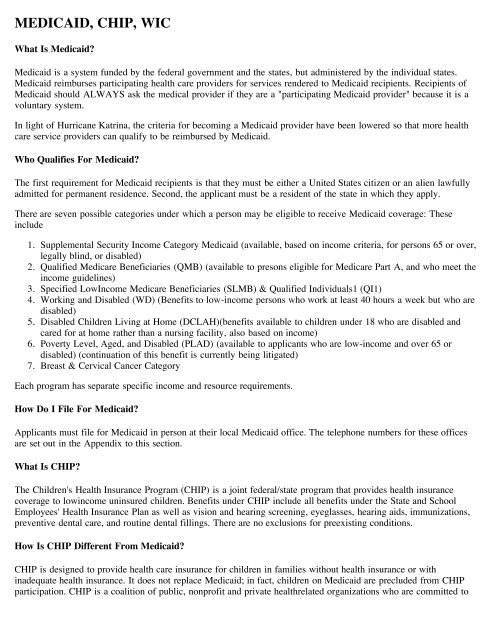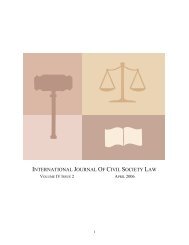Hurricane Katrina: Legal Issues - Columbus School of Law
Hurricane Katrina: Legal Issues - Columbus School of Law
Hurricane Katrina: Legal Issues - Columbus School of Law
You also want an ePaper? Increase the reach of your titles
YUMPU automatically turns print PDFs into web optimized ePapers that Google loves.
MEDICAID, CHIP, WIC<br />
What Is Medicaid?<br />
Medicaid is a system funded by the federal government and the states, but administered by the individual states.<br />
Medicaid reimburses participating health care providers for services rendered to Medicaid recipients. Recipients <strong>of</strong><br />
Medicaid should ALWAYS ask the medical provider if they are a "participating Medicaid provider" because it is a<br />
voluntary system.<br />
In light <strong>of</strong> <strong>Hurricane</strong> <strong>Katrina</strong>, the criteria for becoming a Medicaid provider have been lowered so that more health<br />
care service providers can qualify to be reimbursed by Medicaid.<br />
Who Qualifies For Medicaid?<br />
The first requirement for Medicaid recipients is that they must be either a United States citizen or an alien lawfully<br />
admitted for permanent residence. Second, the applicant must be a resident <strong>of</strong> the state in which they apply.<br />
There are seven possible categories under which a person may be eligible to receive Medicaid coverage: These<br />
include<br />
1.<br />
Supplemental Security Income Category Medicaid (available, based on income criteria, for persons 65 or over,<br />
legally blind, or disabled)<br />
2.<br />
Qualified Medicare Beneficiaries (QMB) (available to presons eligible for Medicare Part A, and who meet the<br />
income guidelines)<br />
3.<br />
Specified LowIncome Medicare Beneficiaries (SLMB) & Qualified Individuals1 (QI1)<br />
4.<br />
Working and Disabled (WD) (Benefits to low-income persons who work at least 40 hours a week but who are<br />
disabled)<br />
5.<br />
Disabled Children Living at Home (DCLAH)(benefits available to children under 18 who are disabled and<br />
cared for at home rather than a nursing facility, also based on income)<br />
6.<br />
Poverty Level, Aged, and Disabled (PLAD) (available to applicants who are low-income and over 65 or<br />
disabled) (continuation <strong>of</strong> this benefit is currently being litigated)<br />
7.<br />
Breast & Cervical Cancer Category<br />
Each program has separate specific income and resource requirements.<br />
How Do I File For Medicaid?<br />
Applicants must file for Medicaid in person at their local Medicaid <strong>of</strong>fice. The telephone numbers for these <strong>of</strong>fices<br />
are set out in the Appendix to this section.<br />
What Is CHIP?<br />
The Children's Health Insurance Program (CHIP) is a joint federal/state program that provides health insurance<br />
coverage to lowincome uninsured children. Benefits under CHIP include all benefits under the State and <strong>School</strong><br />
Employees' Health Insurance Plan as well as vision and hearing screening, eyeglasses, hearing aids, immunizations,<br />
preventive dental care, and routine dental fillings. There are no exclusions for preexisting conditions.<br />
How Is CHIP Different From Medicaid?<br />
CHIP is designed to provide health care insurance for children in families without health insurance or with<br />
inadequate health insurance. It does not replace Medicaid; in fact, children on Medicaid are precluded from CHIP<br />
participation. CHIP is a coalition <strong>of</strong> public, nonpr<strong>of</strong>it and private healthrelated organizations who are committed to

















